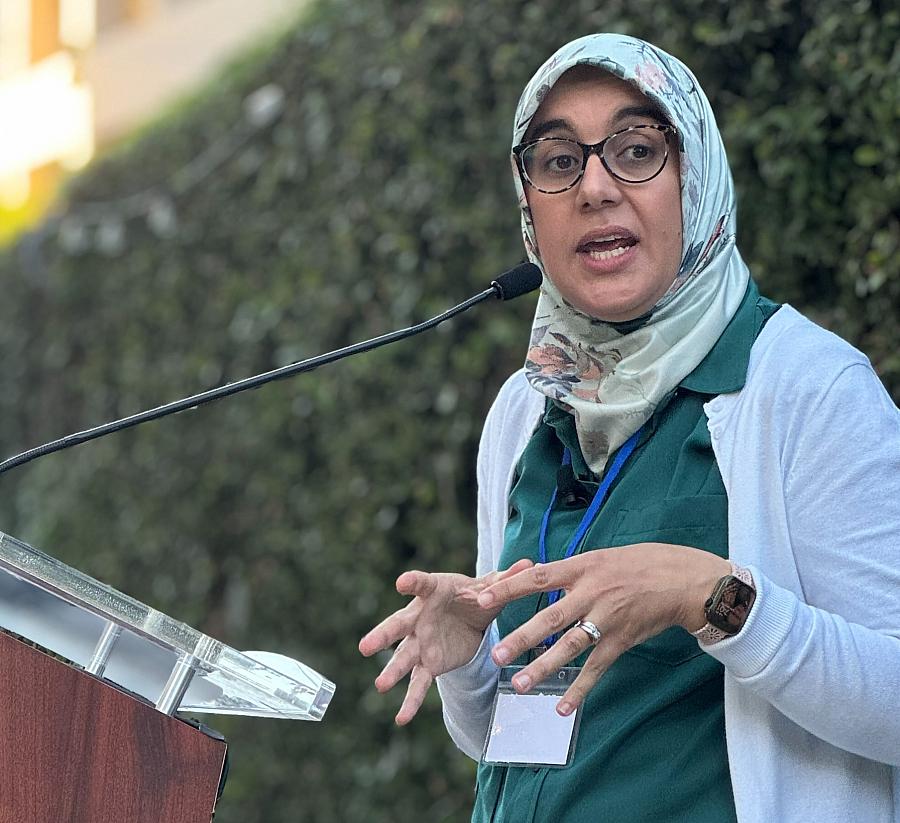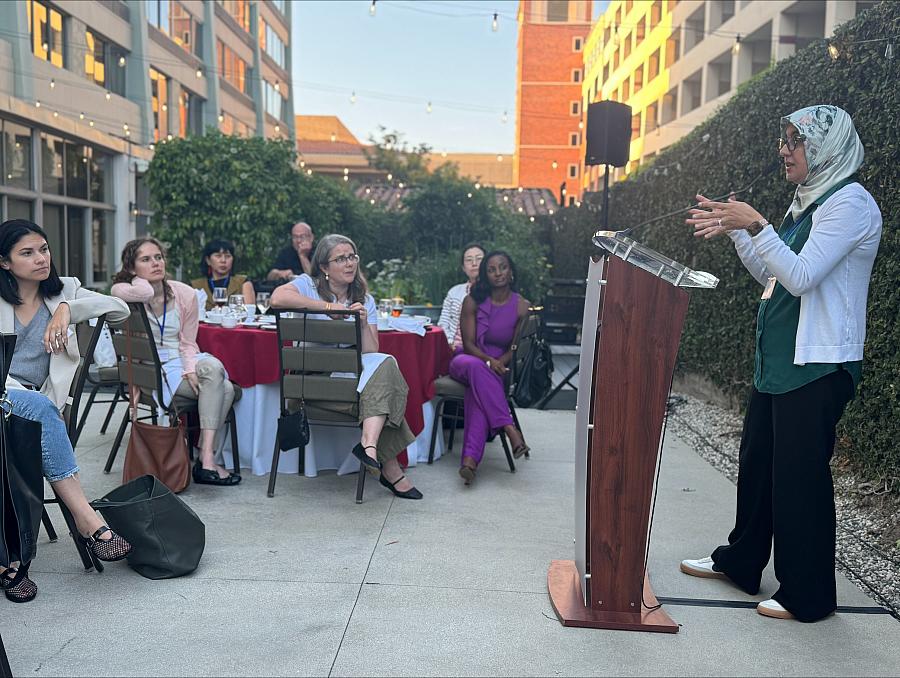How one reporter overcame doubt to reveal the magnitude of America’s hidden stillbirth crisis

Duaa Eldeib delivers the keynote address for the USC Center for Health Journalism's 2024 National Fellowship in Los Angeles on May 25, 2024.
(Photo by Apps Bichu/CHJ)
It’s an expectant mother’s darkest nightmare: The baby that suddenly stops kicking as the due date draws near, the panicked rush to the hospital, the heart that never beats as the nurse runs the fetal monitor across her belly.
Stillbirths have long been viewed in this country as rare and largely unavoidable tragedies, one of inherent risks parents face in bringing a child into the world. But as ProPublica reporter Duaa Eldeib revealed over a series of heartbreaking and deeply reported stories starting in 2022, stillbirths are an overlooked crisis of staggering proportions, made worse by systemic failures of the U.S. health care system to take critical steps that could save many of the babies lost. These stillbirths, she shows us, inflict a kind of pain and devastation on families that never fully goes away.
Eldeib, a Pulitzer Prize finalist for “Stillbirths,” shared the story behind her series and distilled lessons from over two years of rigorous reporting on the issue with Fellows in a keynote address at the 2024 National Fellowship in Los Angeles on Tuesday evening.
When she started, Eldeib had been scouting for stories on the collateral damage from the pandemic, a beat that took her from missed cancer screenings to a huge spike in deaths among dialysis patients, A passing comment from a doctor she was interviewing alerted her to COVID-related stillbirths. Like many Americans, Eldeib had assumed stillbirths were a relic of a bygone era. But the seed had been planted, and she started doing some research. She was soon shocked to learn there were an estimated 20,000 stillbirths in the nation every year. Just as shocking: One study estimated one in four stillbirths were preventable.
“The lack of comprehensive attention and action has contributed to a stillbirth crisis, shrouded in an acceptance that some babies just die,” Eldeib writes in one of the main stories. “Compounding the tragedy is a stigma and guilt so crushing that the first words some mothers utter when their lifeless babies are placed in their arms are ‘I’m sorry.’”
While there’s been a surge in media coverage, advocacy and government action in response to maternal mortality and its sharp racial disparities in recent years, Eldeib found scant coverage of stillbirths, despite the glaring numbers. “In 2020, the CDC reported 861 mothers died either while pregnant or within six weeks of giving birth. That same year, 20,854 babies were stillborn,” she reported in one story.
“In a way this was a story that was hidden in plain sight,” Eldeib told Fellows. “I didn’t unearth some secret memo or recording. I really just found a problem that had been ignored for too long by everyone — by doctors, by lawmakers, by journalists. We had all kind of ignored this problem, even though mothers had been screaming about what happened to them.”
It was by finding those mothers — through nonprofits, Facebook groups, call-outs — that Eldeib’s reporting started transforming from a research project into a narrative force. “Talking to mothers who had had a stillbirth was really the turning point in my investigation,” she said.
They included mothers like Amanda and Chris Duffy, who lost their daughter at 39 weeks, the day before Amanda was scheduled to give birth in 2014. Eldeib powerfully reconstructs their ordeal, rendering their loss through details such as the empty car seat on their drive home from the hospital, or the way, years later, Amanda still rubs orange-scented oil on her wrists to summon her lost daughter Reese. The nurses had placed orange-scented cotton balls in the baby’s blanket during the time the family was allowed to hold her after the emergency cesarean failed to save her life.
These stories are emotionally difficult to read, let alone report, and Eldeib confided that she cried more than ever before while working a story. She debriefed routinely with a friend, and tried to set up boundaries for where she did the work. The time she spent with parents, many who had never had a chance to share their story and enduring grief, propelled her forward.
“The way I see it, records, data, research are the spine of a good story,” Eldeib said. “But it’s the people behind those records, data and research that are the heart of the story.”
The series ultimately drew on interviews of more than 150 people and looked at the crisis from every major angle. One story looked at the racial disparities in stillbirths, with Black women twice as likely to have one, amid bias-ridden health care systems that routinely dismiss their concerns. Another story examined the continued use of the deeply suspect “lung float” test by medical examiners to determine if a deceased baby born at home was a stillbirth or murder victim. Yet another story took Eldeib to Australia to report on how that country has become a model for aggressive government action to dramatically lower its stillbirth rate. The package also features a memorial telling the stories of dozens of families who’d lost their babies, allowing Eldeib to capture many more stories than her in-depth narratives of one or two families could provide.

Eldeib speaks to fellows and mentors at the 2024 National Fellowship keynote.
(Photo by Apps Bichu/CHJ)
It’s easy to think that journalists who make it to the lofty echelons of outlets like ProPublica report out their huge stories with unflappable assurance. Eldeib helped dispel that notion.
“Part of me was scared,” she said. “This journalism had the potential to save thousands of babies’ lives. And it could change the conversation, and it could change policies that have allowed preventable stillbirths to go on for so long. I was terrified… What if I wasn’t the right person? I think I had so much self-doubt because I felt like the stakes were so high.”
She turned out to be the right person. In early June, Congress passed a new bill to federally fund stillbirth prevention and research; it now awaits President Joe Biden’s signature.
That level of impact was far from certain during the first year of the series. The response from lawmakers and health officials was underwhelming; there was no chorus of voices calling for immediate change. “I admit I was sad at first, and again, kind of began to doubt myself,” she said. But she knew she still had many more stories to tell. “I'm just going keep telling these stories, and I’m going to keep beating this drum.”
That drumbeat model of sustained reporting, backed by ProPublica’s influential reach, paid off in the end.
“Keep going,” Eldeib urged her fellow journalists, on the cusp of reporting their own big projects. “You just have to keep going. I think oftentimes we worry we’re not good enough. We worry that it's not going to be perfect. You just have to keep going. Trust your instinct, and keep listening to the stories of the people who are talking to you.”
**

